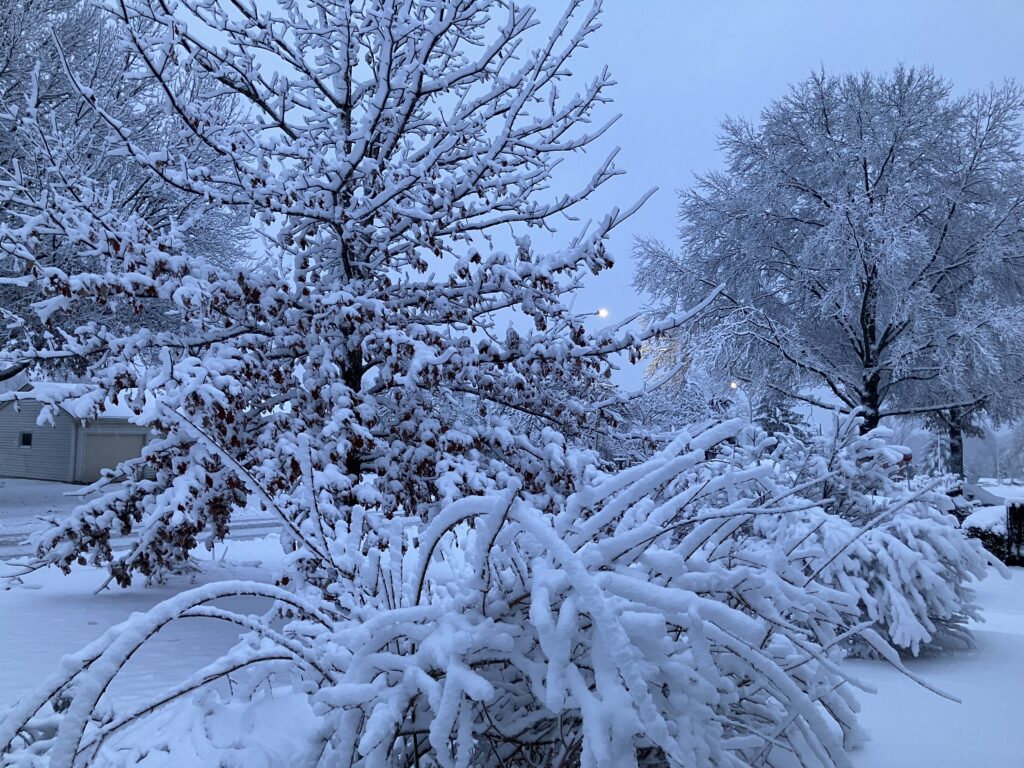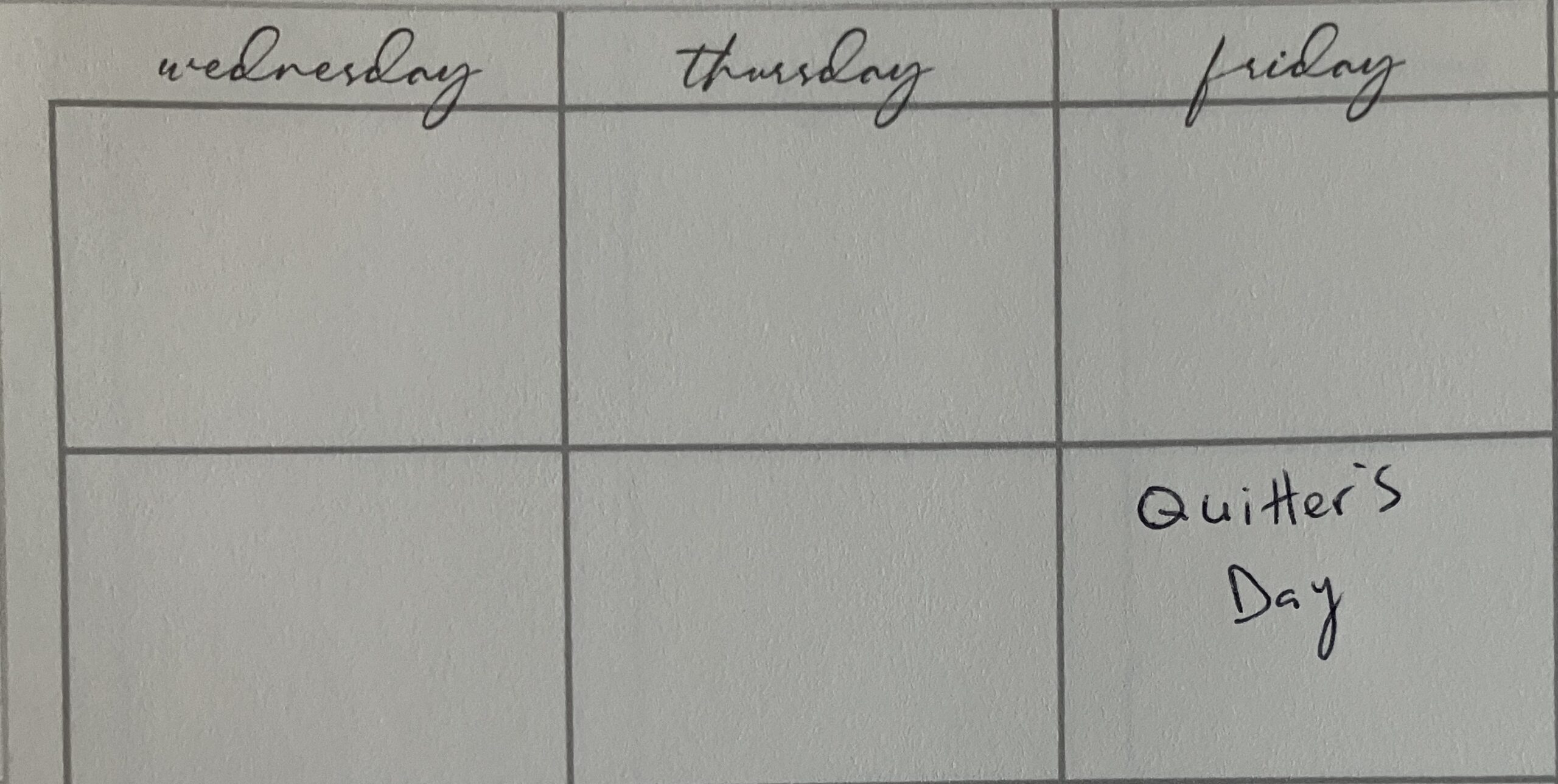I am happy to say that my area has had a milder than average winter. Most of the highs have been near 40 degrees which has afforded me the luxury of continuing my daily run outside instead of being forced to move it to the monotony of my treadmill in our dank, dark basement.
Usually, I’m indoors by November but this winter had been so mild, I was still running outside the first week of January. The second week of January, however, was when winter finally decided to show up. And it intended to make up for every bit of the weakness it had displayed up until that point. It brought snow, subzero temperatures and a windchill from the depths of hell (according to Dante’s Inferno). It was gray and freezing for endlessly cold day after endlessly cold day.
It was during this depressive state of bi-polar winter that a personality I follow posted on social media that it was Quitter’s Day. A quick search informed me that Quitter’s Day is the second Friday in January and is named thusly because that is when most people quit their New Year’s resolutions.

Well, no wonder, I thought as I looked out at the gray sky, listened to the howling wind rattle my doors and windows while I sat in sweats, three sweaters, wrapped in a comforter while sipping on scorching hot coffee and sitting in front of the heat vent sandwiched between two large, furry dogs. I could hardly motivate myself to get out of my cocoon of warmth to go to the bathroom, never mind convince myself to change into exercise gear, climb into my frigid car after braving the subzero windchill to scrape off the windshield and drive to the gym in order to push myself through difficult physical activity that my body was not used to while possibly being filmed by social media influencers so that they could shame me on their platforms for clicks.
I’ve been back running regularly for about 3 years now and it still took every galvanizing cell in my body to convince myself on those chilly, dreary, sunless days to just go downstairs and hop on the treadmill for a little bit. I don’t think I would have succeeded in compelling myself had I not already had the habit deeply ingrained.
Aside from the Christmas season–bursting with activity and decadent foods–I can’t think of a worse time than January to try and resolve to transform yourself into a new person.
- Most people are exhausted from the holidays
- It’s very cold
- It’s very bleak
- There is so much talk about wind chill
- There is already a lot of time and energy expended scraping windshields
- Many people are smack dab in the middle of seasonal depressive disorder
- Everyone is reluctantly going back to work and school
- Everyone is stuck eating store bought eggs because there isn’t enough light for backyard chickens to lay
- Resolutions can be cursory and superficial. Their lack of depth can make them rootless and easy to abandon.
Curious, I looked up who even had the idea to start the year with January instead of other more likeable months like March, April or May. According to various sources including the Encyclopedia Britannica, it was the Romans. Janus, the god for whom the month was named, is the god of new beginnings. And since Rome’s January averages tend to stay above freezing and since the Caesar had never experienced an American midwestern winter, he based his decision entirely on the god of new beginnings thing. That is not something on which to base such an important decision. Not when resolutions are at stake!
Janus is portrayed as having two faces. A more perfect depiction of people who make New Year’s resolutions in January there could not be. We enter the month with our face of naïve optimism dressed in our brand-new gym gear, eating protein bars and shouting, “New Year, New Me!”
Two weeks in, we wear the face of bitter failure, still dressed in our gym gear because it’s elastic while sarcastically saying “New Year, New Me” within air quotes and eating half a gallon of ice cream to drown our misery.
Many have believed that the pagan gods were actually demons and in the case of Janus’s hijacking the start of the year, I’d be inclined to agree. What better way to keep man in a state of discouragement and despondence than by encouraging him to better himself during a season in which personal betterment is next to impossible? Screwtape, himself, could not have advised a situation more preferable! Why do we do this to ourselves?
What if New Year’s resolutions are a humanist deviation from an already divinely established course for improving ourselves? What if New Year’s resolutions are a misinterpreted yearning to participate in the penitential season known as Lent?
We are called to be new people, but it’s not at the beginning of the year only. It’s every day. Yet, knowing we are seasonal people, that we have a longing to be better and we like starting lines, God set aside a season for us to improve ourselves with unbridled enthusiasm.
Lent has all the advantages of New Year’s, additional advantages and none of the pitfalls.
- There is a restorative gap between it and the holidays.
- It has a firm starting point on Ash Wednesday.
- It, too, takes place in winter, but at the end of winter, not smack dab in the bleakest, coldest middle of it.
- Fat Tuesday, otherwise known as Mardi Gras, is similar to New Year’s Eve. It’s a whole day of fun, frivolity, decadent food and saying good-bye to the old you.
- There is an end to it (Easter) which makes it much less overwhelming than the thought of trying to make “New Year, New You” work forever. You’ve just got to make it through 40 days. There’s a goal that can be accomplished.
- A lot of times, after 40 days, the “New You” becomes enough of a habit, you can make it work forever. And if not forever, you at least find yourself in the warmer months in which it’s easier to try and build a new habit. When the months turn cold again, there is hope that the new habit will be so engrained it will be a cinch to overcome next year’s Quitter’s Day.
- For those that think 40 days sounds too far away, it’s actually only until the next Sunday. Because Sundays are the day we celebrate that the bridegroom (Christ) is with us (in the Eucharist). Therefore, we can relax our sacrifices for the day. (Mark 2: 18-22) Think of a God so merciful that he even built in cheat days!
- Lent takes place as winter transitions into spring which not only mirrors what is, hopefully, taking place in us inwardly through all of our austere living, but also gives one motivation outwardly as the days lengthen, warm and brighten.
- There is an entire community of people–the Catholic Church–going through it with you.
- Jesus went through it first to show us how it was to be done. (Matthew 4: 1-11)
- All the sacrifice and self-denial bring you nearer to your goal, yes, but it also brings you closer to God. There’s a depth to Lenten sacrifices that makes them more difficult to give up on.
What are New Year’s resolutions but the desire to free ourselves from enslavement to our vices or the hope to cultivate new virtues within ourselves? This is an excellent description of what goes on during Lent.
If you find yourself giving up the “New You” on another Quitter’s Day, perhaps it’s time to give Lent a try.





0 Comments